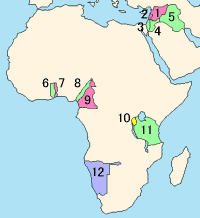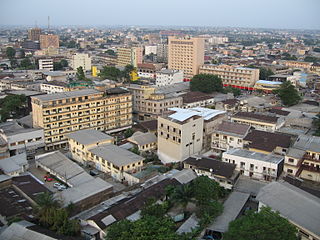Administrative law is a division of law governing the activities of executive branch agencies of government. Administrative law includes executive branch rule making, adjudication, and the enforcement of laws. Administrative law is considered a branch of public law.

A League of Nations mandate represented a legal status under international law for specific territories following World War I, involving the transfer of control from one nation to another. These mandates served as legal documents establishing the internationally agreed terms for administering the territory on behalf of the League of Nations. Combining elements of both a treaty and a constitution, these mandates contained minority rights clauses that provided for the rights of petition and adjudication by the Permanent Court of International Justice.
Universal jurisdiction is a legal principle that allows states or international organizations to claim criminal jurisdiction over an accused person regardless of where the alleged crime was committed, and regardless of the accused's nationality, country of residence, or any other relation to the prosecuting entity. Crimes prosecuted under universal jurisdiction are considered crimes against all, too serious to tolerate jurisdictional arbitrage. The concept of universal jurisdiction is therefore closely linked to the idea that some international norms are erga omnes, or owed to the entire world community, as well as to the concept of jus cogens – that certain international law obligations are binding on all states.
An inquisitorial system is a legal system in which the court, or a part of the court, is actively involved in investigating the facts of the case. This is distinct from an adversarial system, in which the role of the court is primarily that of an impartial referee between the prosecution and the defense.

A justice of the peace (JP) is a judicial officer of a lower court, elected or appointed by means of a commission to keep the peace. In past centuries the term commissioner of the peace was often used with the same meaning. Depending on the jurisdiction, such justices dispense summary justice or merely deal with local administrative applications in common law jurisdictions. Justices of the peace are appointed or elected from the citizens of the jurisdiction in which they serve, and are usually not required to have any formal legal education in order to qualify for the office. Some jurisdictions have varying forms of training for JPs.

In France, the Conseil d'État is a governmental body that acts both as legal adviser to the executive branch and as the supreme court for administrative justice, which is one of the two branches of the French judiciary system. Established in 1799 by Napoleon as a successor to the King's Council, it is located in the Palais-Royal in Paris and is primarily made up of top-level legal officers. The Vice President of the Council of State ranks as the ninth most important civil servant in France.
The Ministry of Justice of Cameroon is the Department responsible for administering the Cameroon justice system. As of May 2004, the Minister of State for Justice was Amadou Ali. The legal system in the Cameroon is complex with a constitution developed in 1972 and revised in 1996 as well as elements of the Code Napoleon, Common Law and customary law. In early 2005, the Ministry of Justice became responsible for administering the prison system due to unrest in the prisons. The Ministry of Justice also has a shared responsibility for administering human rights in the Cameroon. There have been serious allegations about use of torture by police and military officials in the Cameroon.

France's independent court system enjoys special statutory protection from the executive branch. Procedures for the appointment, promotion, and removal of judges vary depending on whether it is for the ordinary or the administrative stream. Judicial appointments in the judicial stream must be approved by a special panel, the High Council of the Judiciary. Once appointed, career judges serve for life and cannot be removed without specific disciplinary proceedings conducted before the council with due process.

The Civil Court of the City of New York is a civil court of the New York State Unified Court System in New York City that decides lawsuits involving claims for damages up to $25,000 and includes a small claims part for cases involving amounts up to $10,000 as well as a housing part for landlord-tenant matters, and also handles other civil matters referred by the New York Supreme Court. The court has divisions by county (borough), but it is a single citywide court.

The judicial system of Turkey is defined by Articles 138 to 160 of the Constitution of Turkey.

In most legal jurisdictions, a supreme court, also known as a court of last resort, apex court, and highcourt of appeal, is the highest court within the hierarchy of courts. Broadly speaking, the decisions of a supreme court are binding on all other courts in a nation and are not subject to further review by any other court. Supreme courts typically function primarily as appellate courts, hearing appeals from decisions of lower trial courts, or from intermediate-level appellate courts. A Supreme Court can also, in certain circumstances, act as a court of original jurisdiction, however, this is typically limited to constitutional law.

Israeli law is based mostly on a common law legal system, though it also reflects the diverse history of the territory of the State of Israel throughout the last hundred years, as well as the legal systems of its major religious communities. The Israeli legal system is based on common law, which also incorporates facets of civil law. The Israeli Declaration of Independence asserted that a formal constitution would be written, though it has been continuously postponed since 1950. Instead, the Basic Laws of Israel function as the country's constitutional laws. Statutes enacted by the Knesset, particularly the Basic Laws, provide a framework which is enriched by political precedent and jurisprudence. Foreign and historical influences on modern-day Israeli law are varied and include the Mecelle and German civil law, religious law, and British common law. The Israeli courts have been influenced in recent years by American Law and Canadian Law and to a lesser extent by Continental Law.

Douala is the largest city in Cameroon and its economic capital. It is also the capital of Cameroon's Littoral Region. It was home to Central Africa's largest port, now being replaced by Kribi port. It has the country’s major international airport, Douala International Airport (DLA). It is the commercial and economic capital of Cameroon and the entire CEMAC region comprising Gabon, Congo, Chad, Equatorial Guinea, Central African Republic and Cameroon. Consequently, it handles most of the country's major exports, such as oil, cocoa and coffee, timber, metals and fruits. As of 2023, the city and its surrounding area had an estimated population of 5,066,000 The city sits on the estuary of Wouri River and its climate is tropical.

The judiciary of Italy is composed of courts responsible for interpreting and applying the law in the Italian Republic. Magistracy is a public office, accessible only to Italian citizens who hold an Italian Juris Doctor and have successfully partaken in one of the relevant competitive public examinations organised by the Ministry of justice. The judicial power is independent and there is no internal hierarchy within. Italian magistrates are either judges or public prosecutors.

The villa Mandessi Bell situated at Douala is a building constructed between 1904 and 1909 by David Mandessi-Bell a rich farmer and commissioner of the king Rudolf Manga Bell. This building is and architecture from the colonial period. It is a representation and legacy of the German occupation in Cameroon.

The Tangier International Zone was a 382 km2 (147 sq mi) international zone centered on the city of Tangier, Morocco, which existed from 1925 until its reintegration into independent Morocco in 1956, with interruption during the Spanish occupation of Tangier (1940–1945), and special economic status extended until early 1960. Surrounded on the land side by the Spanish protectorate in Morocco, it was governed under a unique and complex system that involved various European nations, the United States, and the Sultan of Morocco, himself under a French protectorate. Due to its status as international zone, Tangier played a crucial role for Moroccan Nationalists, who wanted independence, to establish (international) contacts and recruite allies as well as organising gatherings and events.

The Palace of King Bell situated in Douala is a building constructed in 1905 by the Germans for King Auguste Manga Ndumbe. The building is also known as La Pagode; this name comes from the French writer Louis-Ferdinand Céline, who remained in Douala in 1916–17, who calls it such in his famous novel Voyage au bout de la nuit.

The old German government headquarters situated in Douala is a building constructed in 1891 by the Germans in a classical Prussian style.

The former General Hospital situated in Douala is a building constructed in 1896 by the Germans and designed by the architect Henri Drees.

The former police station situated in Douala is a building constructed at the beginning of the 20th century by the Germans to serve as the first police station under the German mandate.


















